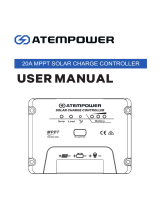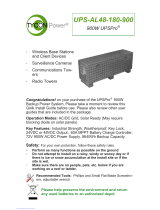Page is loading ...

RPSTL 12/48M
RemotePro®
Remote Power System
▫ Wireless Base Stations
and Client Devices
▫ Surveillance Cameras
▫ Remote Sensors
▫ Remote Lighting
▫ Off Grid Electronics
Congratulations! on your purchase of the RemotePro™ off-grid
remote power system. Please take a moment to review this Qwik
Install Guide before assembly or battery installation. Other in-
structions come with other components of this kit. Be sure to re-
view all instructions.
DANGER! Avoid Powerlines!
You Can Be Killed!
When following the instructions in this guide take extreme care
to avoid contact with overhead power lines, lights and power circuits.
Contact with power lines, lights or power circuits may be fatal. We rec-
ommend to install no closer than 20 feet to any power lines.
Safety: For your own protection, follow these safety rules.
▫ Perform as many functions as possible on the ground
▫ Do not attempt to install on a rainy, windy or snowy day or if
there is ice or snow accumulation at the install site or if the
site is wet.
▫ Make sure there are no people, pets, etc. below when you are
working on a roof or ladder.
Recommended Tools: Phillips Screwdriver, 13mm and 10mm
Wrench, 5/16” nut driver, Flat Blade Screwdriver
Please help preserve the environment and return
used batteries to an authorized depot. Most auto
parts stores will pay you for old batteries.

2
Qwik Install
CAUTION: Be sure to connect the bat-
tery to the controller first and discon-
nect it last. Connecting solar panels to
the controller without the battery con-
nected could damage the controller.
Note: There are two different styles of so-
lar panel mounts used for these systems.
For the 340W solar panel array the mount
is a side of pole mount where the user
supplies the 2-4”pole. For the 720W and
1440W solar panels, the mount is a top of pole mount which includes
the pole. It requires a poured cement foundation.
STEP 1: Assemble the solar panel mount
and set the correct tilt angle based on your
Latitude. There is a useful tool to calculate
optimum angle at https://
calculators.tyconsystems.com. If you will
be using a fixed angle all year we recom-
mend using the optimum angle for winter
sun. You can also calculate winter tilt us-
ing: Your_Latitude*0.9+30. Solar panels
should face south if you are in the northern
hemisphere. When mounting the enclo-
sure, be sure to mount low enough so the
door of the enclosure clears the solar pan-
els when opened. We suggest mounting
the enclosure so it is shaded by the panels during the day.
STEP 2: Attach the solar panels to
the solar panel mount so that the
wire junction box is towards the top
or side. Connect the solar panel MC
-4 connectors in series configura-
tion. For the 1440W solar array wire
panels in series and parallel config-
uration.
TIP: We strongly recommend in-
stalling the batteries and other
equipment in the enclosure after
mounting the enclosure to the pole.
STEP 3: Attach top and bottom
brackets to the enclosure.
STEP 4: Mount the enclosure to the
pole using U-Bolts and/or 4 hose

3
clamps. The enclosure can also be wall mounted using appropriate lag
bolts (supplied by customer).
STEP 5: Attach the included DIN Rail to the door using hardware pro-
vided.
STEP 6: Install 4 cable feedthroughs to the bottom of the enclosure.
TIP: There are multiple cable gland feedthrough in the bottom of the
enclosure. If you are not using any of the feedthrough you can cut a
short piece of wire, put it through the cable gland and tighten the cable
gland on the wire to seal it.
STEP 7: Remove the fuse from the battery cable(s) and connect
wires to the batteries, then install the batteries.
STEP 8: Attach the green DIN Rail clips to the MPPT
controller bracket using screws provided and attach the
bracket to the controller. The extra parts aren’t used.
Remove the small plate on the controller back to ac-
cess the wire terminal screws. Connect the battery
wires and the wires from the PowerVent™ fan to the
controller battery input for 12V or 24V battery configu-
ration and directly to one or two of the batteries if 48V configuration. Be
sure to observe proper polarity. (RED=+).
CAUTION: Reverse polarity connections will damage the equip-
ment.
STEP 9: Connect the included solar
panel cable to the MPPT controller PV
inputs (Red to PV+). Don’t connect
the solar cable to solar panel connect-
ors until the controller is connected to
the batteries.
STEP 10: Connect your load to the
MPPT Controller load output. When
the MPPT controller is energized with
full battery voltage the load will turn on
automatically.
STEP 11: Replace the wire terminal
access door on the back of the MPPT controller and mount the MPPT
controller to the DIN rail mounted on the enclosure door.
STEP 12: Double check wiring and then re-install the battery cable
fuse to energize the system. The MPPT controller will power up and
automatically detect the battery configuration. The display is activated
by vibration, so to turn on the display, tap the glass cover. Once the
controller is energized, connect the solar panel connectors to the solar
cable coming from the MPPT controller PV input.
CAUTION: Reverse polarity connections will cause damage.

4
MC-4 Connectorized Panels Wiring Configurations using MPPT Controllers
340W Four Panel Configuration for 12V or 24V or 48V Battery Configurations
Important Note: The MPPT Controller ships with AUTO detection
of battery voltage enabled. We suggest changing this to a fixed 24V,
if using a 24V battery configuration, or fixed 48V, if using 48V
configuration, so that the system can recover automatically if, by
chance, the batteries get drained completely. See MPPT controller
user manual for specific instructions.
STEP 13: Make sure lid gasket is clean and free from any particles,
then carefully close the cover, making sure that wires are clear of the
seam and hinge area. Use your own lock to secure the door.

5
720W Two Panel Configuration for 12V or 24V or 48V Battery Configurations
1440W Four Panel Configuration for 24V or 48V Battery Configurations

6
CAUTION: Be sure to connect the battery to the controller first and dis-
connect it last. Connecting solar panels to the controller without the bat-
tery connected could damage the controller.

7

8

9
TECH CORNER
Additional Information you may find useful
1. CONTROLLER: The 60A MPPT controller turns off power to the 30A
load if the voltage gets too low and automatically turns the load power
back on when the voltage recovers. This protects battery from overdis-
charge and increases battery life and performance.
2.Fuse: There is a fuse in the battery cable (30A).The fuse is in-line
with battery power. If fuse is blown there was some sort of short in the
battery connection and the controller will appear dead. Replace with a
30A fuse.
3. VENTING: The enclosure is vented thru the PowerVent™. The
12/24V fan is thermostatically controlled and will turn on when the tem-
perature inside the enclosure exceeds 45° C.
4. BATTERY MAINTENANCE: The batteries used in the RemotePro®
systems don’t require any maintenance. They should last up to 5 years
in normal use.
NOTE: Never store batteries for a long time in a discharged state
or it will kill the battery. Especially in cold temperatures.
5. Remote Monitoring: There is an RS485 port on the MPPT control-
ler. This port is a special port to interface to the Tycon TPDIN-Monitor-
WEB3 V2 using a TPDIN-CABLE-485 cable for remote monitoring via
Ethernet.
The RS485 port can also be used with the Tycon TP-SC-WiFi to pro-
vide connectivity to a wireless network. To provide a connection to a
PC, use the TP-SC-USB-RS485. Software and instructions are availa-
ble at tyconsystems.com.
6. BATTERY OVERDISCHARGE: We highly recommend hooking all
equipment loads to the controller load output. This output will discon-
nect the load if the battery voltage drops below 11V (12V battery) or
22V (24V battery) or 44V (48V battery) and this will protect the battery
from over-discharge. If batteries get completely discharged (<10V) be-
cause the equipment was connected directly to the battery, you will re-
duce the battery life and you will most likely need to recondition them
with a good quality 10A automotive battery charger. Avoid charging for
longer than 24hrs to avoid battery damage. Once they are back to a
normal operating range, the integrated charge controller will maintain
the charge.
7. TROUBLESHOOTING:
A. There is no load output from the controller —If battery voltage is
too low the charge controller will turn off the load outputs. On a 12V
battery system the load will turn off if battery is <11V. On a 24V bat-
tery system the load will turn off at <22V. On a 48V system the load

10
will turn off at <44V. The load will turn back on automatically when
the battery voltage recovers. See controller user guide for more
detail.
B. Why is my solar panel voltage so high?- Open circuit voltage
on a 12V panel is around 23V, and about 47V on a 24V panel.
With MPPT controllers, the most efficient operation is achieved by
wiring 12V or 24V panels in series. On 24V panels the controller
can only handle two panels in series because four 24V panels in
series would exceed the controller max voltage. So in 4 panel
configurations wire the panels in series/parallel configuration.
C. My system turns off at night and comes back on in the morn-
ing?- This is a sure sign that the solar panels and/or battery ca-
pacity can’t support the load. You should measure your actual
load and recalculate to make sure you have adequate capacity.
Go to https://calculators.tyconsystems.com to calculate your ex-
pected system capabilities.
D. Can I charge my batteries from AC power? Tycon offers 600W
and 900W AC/DC battery chargers that can be used in parallel
with the solar controller to charge batteries from AC power from
the grid or a generator. It requires a blocking diode (5600059).

11
SPECIFICATIONS Subject to change without notice
12V 24V 48V
Battery Capacity (12V) 200 or 400Ah
Reserve Power @ Rated Load >24 hours
Load Output (unregulated) 12V 30A 24V 30A 48V 30A
Battery Voltage (DC) 12V 24V 48V
Battery Type Valve Regulated Sealed Lead Acid
AGM or Lithium LiFePO4
Battery Life 5 Years AGM; 10 Years Lithium
Controller Type 60A MPPT—Temperature Compen-
sated
Over-Voltage Protection 16V 32V 64V
Bulk Charge 14.4V 28.8V 57.6V
Float Charge 13.8V 27.6V 55.2V
Over-discharge protection 11.1V 22.2V 44.4V
Over-discharge recovery volts 12.6V 25.2V 50.4V
Controller Self Consumption <1W
Enclosure Type Powder Coat Steel
Wind Survivability 90MPH
Operating Temperature -30°C to +60°C AGM
0°C to +60°C Lithium
12/24V 60A MPPT
Negative Ground
12/24/48V 60A MPPT
Positive Ground

12
Limited Warranty
The RemotePro® products are supplied with a limited 36 month warran-
ty which covers material and workmanship defects. This warranty does
not cover the following:
▫ Parts requiring replacement due to improper installation, misuse,
poor site conditions, faulty power, etc.
▫ Lightning or weather damage.
▫ Physical damage to the external & internal parts.
▫ Products that have been opened, altered, or defaced.
▫ Water damage for units that were not mounted according to user
manual.
▫ Usage other than in accordance with instructions and the normal
intended use.
Tycon Systems
930 W 14600 S Ste 600
Bluffdale, UT 84065
support@tyconsystems.com
PH: 801-432-0003
/














